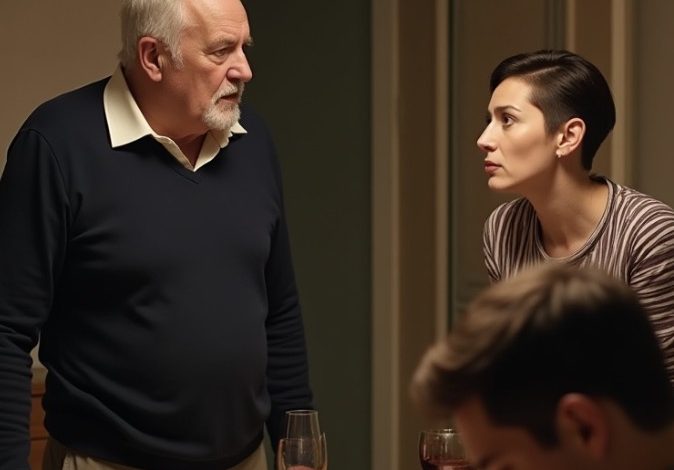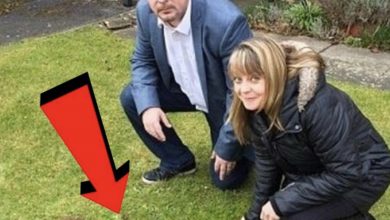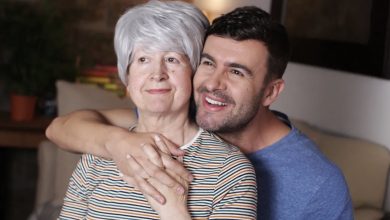The Night I Walked Out and the Surprise That Made My Daughter in Law Beg for Forgiveness

At dinner my daughter-in-law smiled with a cold edge and said, “Enjoy this meal — it’s your last one here. Tomorrow you’re going to a nursing home.” I rose from the table without a word and walked out of the room. I had been ready for that moment longer than anyone guessed. By the next day she would be on her knees begging me to forgive her, because what they tried to do backfired — and fast.
My name is Reed Holloway. I am sixty-five years old. For the last five years I’ve been living in my son’s home. I did not move in because I liked being dependent; I moved in because after Evelyn died, the big house we shared felt empty and filled with memories I could not bear. I had sold my house, taken the money, and trusted my son to help make a new, private suite for me in his home. I gave him three hundred thousand dollars to do it.
At first the plan made sense. My son Adrien insisted. “Dad, we have room,” he said. “Lily will love having Grandpa close by.” Lily, my granddaughter, had Evelyn’s eyes, and I wanted to be near her. I put the rest of the sale money into safe accounts, a habit I learned as a tax consultant. Rule number one: keep money where you can find it when you need it.
The first months went well. Then things changed. Months went by and the suite never appeared. I heard the purr of a new engine one afternoon and saw Adrien’s smile as he climbed out of a brand-new SUV. He looked pleased. I did not say anything. It was his life and his choices.
Then the small signs started. Veronica began to work later and later. Dinner became quieter. I’d sit at the table while she scrolled her phone and Adrien stared at the television. One morning I found brochures for “active retirement communities” on the coffee table. Sunny Hills. Golden Years Living. The booklets were glossy and cheerful. I tossed them in the trash, but they kept returning like a rumor.
One afternoon I overheard Veronica on the phone in the kitchen. Her voice was low and pointed. “Yes, that’s standard. Twenty percent on top is normal,” she said. When she saw me, she forced a smile. “Reed, you’re home early. I’ll be late tonight. Can you pick Lily up?” She left a brochure on the table. “Take a look. Sunny Hills is wonderful.”
I pulled the brochure from the trash and actually read it. The words were gentle but the message was clear: there is a polite way to tell someone they no longer fit into your life’s plan.
I called my old friend Oliver Price, the realtor who had handled the sale of my house. “Oliver, it’s Reed,” I said. “Do you have anything small and near the ocean? A bungalow, maybe?” He did not sound surprised. “I thought you might move out of Adrien’s sooner or later. I’ll send you three places.”
They arranged a viewing and I liked the little bungalow by the coast — quiet, light, easy to care for. It felt like a place I could make my own again.
The real test came that evening at dinner. Adrien looked down while his wife opened their planned speech.
“Dad,” he said without making eye contact, “we all think it might be better if you consider living in a place designed for older people.”
“A nursing home?” I asked, my voice flat.
“An active retirement community,” Veronica corrected, the phrase already prepared. “Sunny Hills has a pool, activities, medical staff if you need it.” She blinked like she was offering comfort.
“And Lily needs her own room,” she added. “She’s growing up. She needs her space.”
I glanced at Lily, who was picking at her food. Her face was small and confused. “Lily has a room,” I said.
“She needs a bigger room,” Veronica snapped.
“Have you planned when I move?” I asked.
Adrien answered. “We signed you up for a tour next Friday.”
The words landed like a sentence. They had signed me up without asking. Then Veronica leaned forward and said the line she had practiced, a smirk on her lips. “So enjoy this meal — it’s your last one here. Tomorrow you start your new chapter.”
I stood. I did not yell. I did not beg. I simply left the table and walked upstairs to my room. They took my silence as a broken man’s surrender. They were wrong. My quiet that night was the calm before a decision I had already made.
I could have argued. I could have called them out in front of Lily. But I am a man who plans, not rages. I packed a single suitcase before dawn and slipped out. I left a short note on the desk: I am moving. There is no more to say.
The cab driver dropped me at the bungalow in Ocean Beach. It was small, but it had a porch and a view of the water. The air smelled of salt and something like relief. I signed the papers and for the first time in months I felt light.
When Adrien and Veronica learned I had moved, they were stunned. My leaving had a ripple effect on the household. Adrien had taken out a large loan against the house, counting on my continued presence and help to cover it. Veronica had been budgeting an image and a life that depended on other people’s assistance, not their own savings.
They called me and begged and accused. Veronica’s voice broke more than once. “Dad, this was unfair,” she cried. “We had plans. You ruined everything.”
I listened and then I set terms. I was willing to help them for a short time, but only if it came with real change. No more borrowing, no more spent-on-credit lives, clear budgets, and one simple rule: Lily visits every weekend, not on someone’s terms but on mine. They accepted, desperate men accept when the cliff reaches their front step.
At first I told myself I had been merciful. I sent money to help with mortgage payments for six months. I asked for updates. I insisted they see a financial planner and that they cut back on luxuries. Veronica sold the SUV. That small, visible act changed the tone in the house. Adrien’s shoulders dropped; he stopped fidgeting at the table.
But the real change was not the money. It was the quiet lesson my leaving taught. They had assumed I would stay because that was easier. They had assumed their plan had no cost. My departure showed them the cost.
While I sorted the bungalow and learned the best places to buy fish or the early morning paper, I found small joys. I joined a Friday card game at the café and met other men who liked to sit and talk about the tide. I took up fishing again, the patient kind where you sit and wait more than you act. Lily came on weekends and we built a small wooden boat together in my garage. The first time she steered it on the small pond at the park, she laughed like a bell. I took that sound home and set it on the mantle.
Months passed and the crisis at Adrien’s eased. The loan payment plan was adjusted. Veronica went back to work more steady and less frantic. She stopped scrolling during dinner. When she came to the bungalow to pick up Lily one Saturday, she stood on the porch looking through the screen door at us building a model boat. For a moment she looked small and tired. She said, “I’m sorry, Reed.”
There are things you can never take back and things you can try to heal. Her apology was not dramatic. It was simply an offering. In time she knelt at my feet on one rainy day, tears in her eyes, and asked for forgiveness not with a grand plea but with a simple honesty I had never expected. “We were careless,” she said. “We thought money was the same as life. We were wrong.”
I forgave her because holding onto anger would have stolen more than her had. I forgave her because Lily needed both her parents and because a life led in bitterness makes no room for a little girl. But I also set rules. There would be no quick loans, no secret accounts, no more plans made without me knowing and consenting. They promised.
Time allowed wounds to heal in small, steady ways. Adrien got a steady client who paid on time. Veronica found work that did not require the fake smiles of social media. They began to plan real savings, not illusions. Lily came to stay every other weekend. We planted a small vegetable plot behind my bungalow and she loved picking cherry tomatoes. One day she turned to me and said, “Grandpa, when I grow up I want a little house like this.” My chest tightened and I told her that she could have it if she wanted, because the bungalow had become more than four walls — it was a place for honesty.
I do not pretend this was a perfect victory. Family relations are messy. There were nights when resentment crept back in, when a word was said wrong, when old hurts reappeared. But the big change had happened: I had stopped being a plan and started being a person in my own right. I had set boundaries and kept them.
One of the best parts of moving was how it forced conversation. Instead of having money control our relationship, we talked. We talked about budgets and who needed what. We talked about Lily’s school and about small habits that make life better — like calling before you come over and being on time for birthdays. Those are small civics, and they make family life bearable.
A year after I moved, I received a letter from Veronica. It was short, hand-written in a shaky script. She had decided to go back to school part-time and retrain for work she felt proud to do. She thanked me for my patience and said she hoped I could come to Lily’s school play that spring.
I went. Watching Lily on stage, hair in a ribbon, pretending to be a sailor, I felt the old afternoon sun warm me in a new way. My life had narrowed into a clear bright line that ran from that tiny stage to the table where we would later eat a simple dinner. I no longer needed someone else to decide where I belonged.
There is a small truth here that I want to share with anyone who reads this: dignity is not given by others. It is taken, often with a quiet step and a single suitcase. People confuse gentleness with weakness, and sometimes that mistake costs them a home. I did not want to make my son fail. I wanted him to learn to stand. My leaving was as much for him as it was for me.
We rebuilt slowly. Adrien and Veronica learned to live within their means. They stopped measuring life by appearances. They found a real rhythm that had been missing. Lily learned to ask and to expect truth. And I — I learned how to live again, with a small front porch and an old wooden workbench where I fix things and think about the sea.
The day Veronica knelt on my porch and asked for forgiveness was not the end of anything. It was the start of a slow repair. She did not fall to her knees in shame and beg for miracles. She simply said, “I was wrong. Will you forgive me?” I looked at her, then at Adrien, then at Lily. There are moments when saying yes costs nothing and saves everything. I said, “Yes.”
We moved forward together, not by erasing past errors but by building new habits. My life is quieter now and richer for it. I sleep well at night, and when Lily runs across the lawn to hug me, the years of worry wash away like tide water on sand.
That night at dinner when she told me to enjoy my last meal, Veronica thought she had won something. Instead, she helped set in motion the one thing that made us all change: the truth, finally spoken, and the courage to act on it. That was the moment everything turned.










